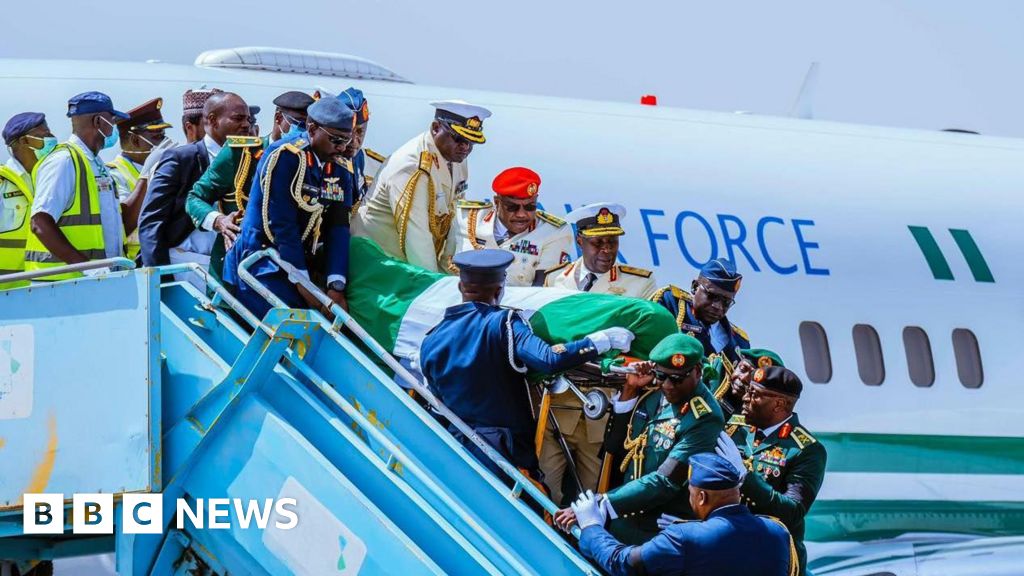Ex-Nigeria President Buhari buried at home

```html Former Nigerian President Muhammadu Buhari Buried in Daura
Nigeria's former President Muhammadu Buhari has been laid to rest in his hometown of Daura, Katsina State, following his death in London at the age of 82. The funeral took place on Tuesday, with dignitaries including President Bola Ahmed Tinubu and representatives from neighbouring countries in attendance.
Buhari, a former army general, served as president for two terms after being elected in 2015, marking the first time an opposition leader defeated a sitting president in Nigeria. His passing has been met with tributes from across the political spectrum, acknowledging his long career in public service.
National Mourning and Public Holiday
The Nigerian government declared Tuesday a public holiday to honour Buhari. His body was flown back to Nigeria, where it was received by President Tinubu at Katsina airport before being transported to Daura for the funeral rites.
Islamic funeral prayers were held at the central mosque in Daura, attended by hundreds of mourners. Following the prayers, Buhari's body was interred in a grave within his home compound. Military honours were rendered before the burial, including gun salutes and the presentation of the Nigerian flag to his family.
Tributes From Across the Political Divide
Tributes have poured in for the late president from both allies and former political rivals. Former President Goodluck Jonathan, whom Buhari defeated in 2015, described him as "selfless in his commitment to his duty" and praised his patriotism.
Former military ruler General Ibrahim Babangida, who ousted Buhari in a 1985 coup, also offered his condolences, stating that Buhari "remained a moral compass to many, and an example of modesty in public life."
President Tinubu has declared a seven-day national mourning period, with national flags flown at half-mast across the country. The government has emphasized its commitment to honouring Buhari's legacy with dignity.
Buhari's Legacy: A Mixed Record
Buhari's time in office was marked by both successes and challenges. He made significant strides in combating Boko Haram insurgency in the northeast. However, his administration also faced criticism for its handling of the economy and allegations of human rights abuses. According to Dr. Amina Salihu, a political analyst at the Centre for Democracy and Development in Abuja, "Buhari's legacy is complex. He will be remembered for his anti-corruption stance and efforts to improve security, but also for the economic hardship experienced by many Nigerians during his tenure."
Economic Policies Under Scrutiny
One of the key criticisms of Buhari's government was its economic policies. His administration implemented measures such as border closures and import restrictions aimed at boosting domestic production, but these policies were often criticized for contributing to inflation and hindering economic growth. "The Buhari administration inherited a struggling economy, and while they made efforts to diversify, the results were mixed," says Professor Adebayo Williams, an economist at the University of Ibadan. "The dependence on oil revenue remained a significant challenge."
The Fight Against Corruption
Buhari came into office promising to tackle corruption, a major issue in Nigeria. His administration initiated several high-profile investigations and prosecutions. However, critics argued that the anti-corruption campaign was selective and politically motivated. While there were successes, the perception of widespread corruption persisted throughout his presidency.
Historical Context: From Military Ruler to Democratically Elected President
Buhari's political career is unique in Nigerian history. He first came to power as a military ruler in 1983, following a coup d'état. He was overthrown in 1985. His return to power in 2015 through democratic elections marked a significant turning point in Nigerian politics. His journey from military leader to democratically elected president is a testament to Nigeria's evolving political landscape.
Challenges for the New Administration
As Nigeria mourns the loss of its former leader, the focus now shifts to the challenges facing President Tinubu's new administration. These include addressing economic issues, tackling insecurity, and promoting national unity. Buhari's legacy will undoubtedly shape the political discourse in Nigeria for years to come. ```
Originally sourced from: BBC News Africa
